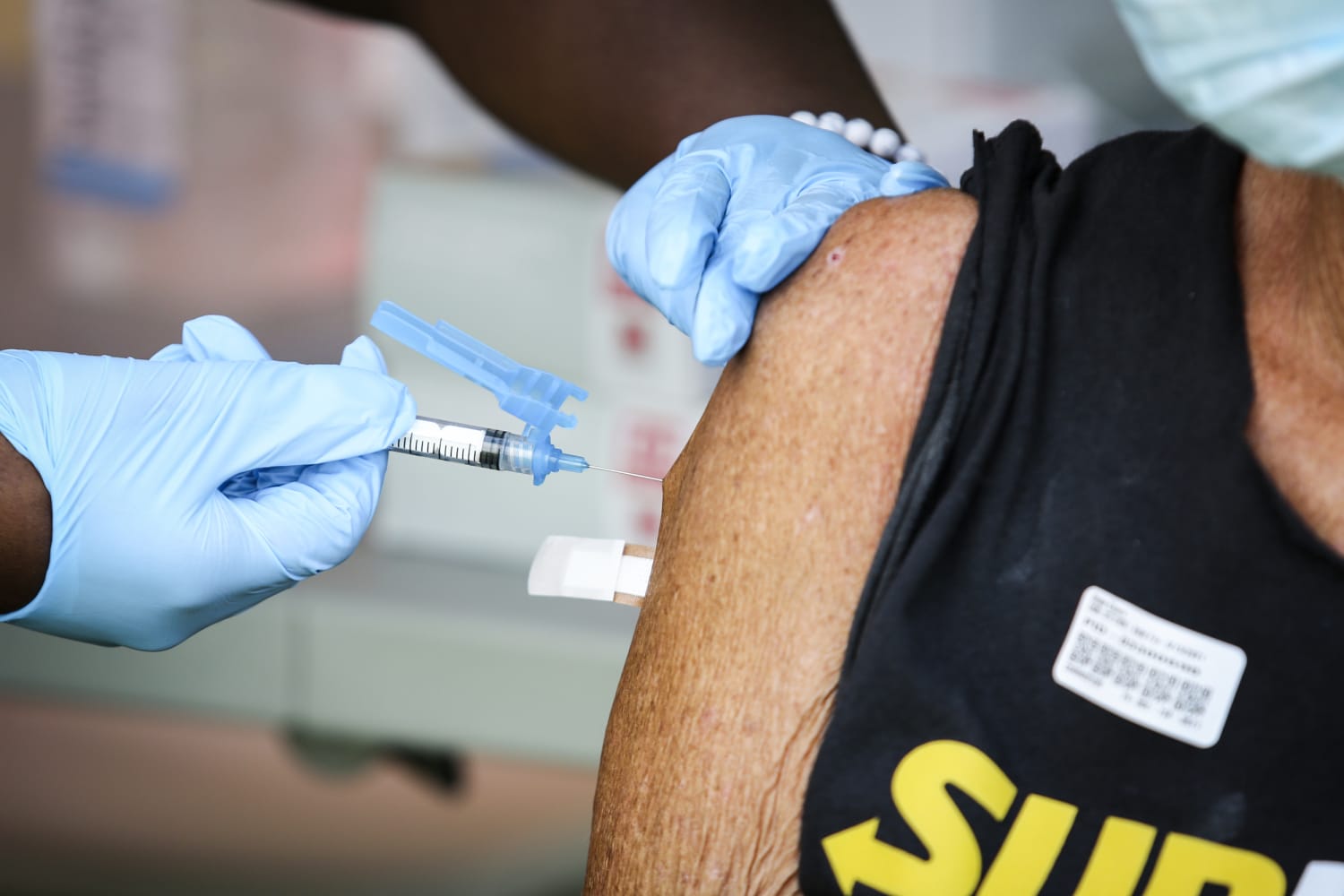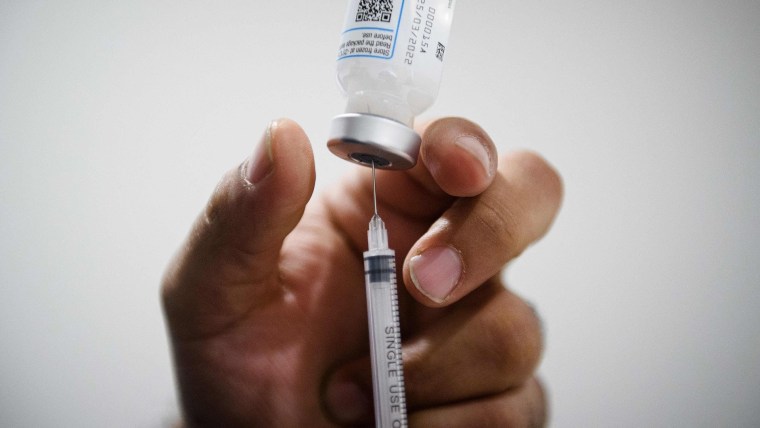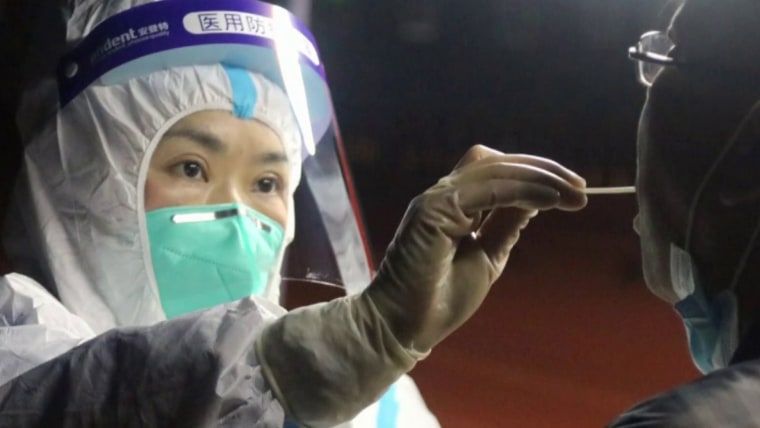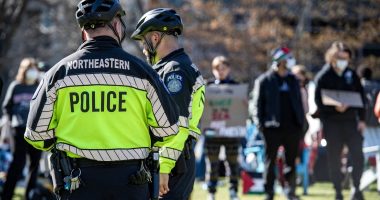Brooke Evans tested positive for Covid-19 in January while living in shared housing in Madison, Wisconsin, where she advocates for homeless people and on housing issues.
She is certain the Pfizer vaccines and booster shot she received last year — and were provided to her despite being uninsured — helped save her life.
But the effects of the coronavirus still linger, and she’s fearful it may be a sign of long Covid.
“Unfortunately, I was one of those Americans for whom it has taken weeks and weeks to recover,” Evans, 30, said. “I still do not feel like myself.”
If she were to contract Covid again and need treatment or seek to get a second booster shot when it’s available, she expects those to come at a cost she can’t afford. That’s because the White House has warned that starting Tuesday, it will phase out a Covid program that reimburses doctors and medical providers the cost of testing, treating and vaccinating the uninsured.
The arrangement is set to end in early April — the result of a lack of federal government funding after Democrats and Republicans in Congress were unable to agree on an additional $22.5 billion in budget allocation that the White House had requested for Covid relief.
In 2020, about 28 million people had no insurance, according to the Census Bureau, while Medicaid and children’s health insurance enrollment rose sharply during the pandemic to nearly 85 million people as of last fall.
The program that has been critical to ensuring that the uninsured have equal access to Covid-related care is fading out at a time when cases and hospitalizations are low, and as states and cities wind down pandemic restrictions. But that shouldn’t mean that government funding is no longer necessary to help the uninsured, health care advocates and public health policy experts say.
“When you have the time and space to breathe, that’s when you prepare and make sure everyone’s being taken care of, not when more and more people are dying every day,” said Dr. Michael Mina, a former Harvard University epidemiologist and now the chief science officer for eMed, a startup that sells at-home Covid tests.
Download the NBC News app for breaking news and politics
He said the country has already seen what happens when the federal government is caught flat-footed, after demand for tests soared over the holidays as the omicron variant began to spread rapidly.
“You don’t go to a race and start training and preparing the day of the race,” Mina said. “That would be a massive mistake.”
Dr. Howard Forman, a professor of public health at the Yale School of Medicine, said people hit the hardest by a loss of Covid funding will be “those who have the greatest risks, due to lower resources and less access to usual care.”
Even those who are insured will have to weigh whether they can afford to seek care, he added.
“Think about the person with a large deductible who would readily access a free monoclonal antibody clinic or testing site for testing and early treatment, but who might be afraid of large bills if they went to a private physician or even a hospital,” Forman said.
And without ongoing immediate funding, senior administration officials this week painted a bleak picture in the nation’s fight against Covid.
They warned the federal government would not have adequate resources to purchase enough booster doses for all people or there would be shortages if a new variant-specific vaccine is needed; it won’t be able to buy additional oral antiviral pills beyond the 20 million already secured, as well as additional monoclonal antibody treatments, which are being shipped to states and expected to run out as soon as late May; and it would have to scale back the purchase of treatments meant for immunocompromised people.
There may be a lull in cases now, Mina said, but the threat of a new variant and with the Centers for Disease Control and Prevention cautioning that Covid is likely here to stay as a seasonal virus should encourage pre-emptive measures to be taken.
“To think we’re at a stage to stop appropriating funds and advocating for pandemic preparedness, I think, it’s one of the worst decisions that our government could make,” he said.
During the pandemic, Congress has approved some $4.6 trillion worth of Covid aid spending, according to Department of Treasury data. But Republicans have demanded full accounting of how the money has been spent, and have balked at further funding than is necessary.
“I’m not convinced of the need yet, but I don’t know for sure. So I’m open-minded on that,” Sen. Richard Shelby of Alabama, the ranking Republican on the Appropriations Committee, said this week.
“We need a real accounting for the money,” he said, adding that if money is “not hidden” and a need is demonstrated, Congress could revisit the issue.
House Speaker Nancy Pelosi, D-Calif., was forced to remove all pandemic aid from the sprawling $1.5 trillion government spending package passed last week in a compromise with members of her own party that also ensured the broader bill would survive. But it also underscored the shifting priorities in Washington amid the raging conflict in Ukraine and the rising consumer costs.
Pelosi told reporters this week that she still hopes to offer a separate bill to ensure some Covid funding, but any such measure would likely face swift Senate Republican opposition.
Community health care centers that routinely deal with the uninsured and the indigent are anticipating what the impact will be when reimbursement funding dries up.
“I think it will be catastrophic for us,” said Jim Mangia, CEO of the south Los Angeles-based St. John’s Community Health, which serves a largely Latino population, as well as uninsured and undocumented people.
His nonprofit health center was one of the first to pilot the White House’s program offering anti-viral Covid pills, and he said many of those who have taken advantage of Covid treatments and vaccines are front-line workers, restaurant staff and factory employees who may not have insurance or have limited coverage.
The health center serves about 120,000 patients a year, and about 40,000 are uninsured. When Covid vaccines became widely available in the spring of 2021, the center ramped up to 26 vaccination sites and lines quickly formed.
Now, Mangia anticipates losing the center’s supply of monoclonal antibody treatments, as well as its ability to offer broad Covid testing and treat the uninsured for Covid services through Medicaid coverage.
“This is the absolute wrong time to be doing this,” he said. “It’s like being at the very point you’re about to get over the hill and you see the horizon, and then your legs are cut off.”
Michael Howley, 31, of San Francisco said he was recently uninsured for several months and was grateful to have had free access to Covid testing and a booster shot.
While he now has insurance through his job in environmental cleanup services, he counts himself lucky, but worries what kind of access will be made available for the most vulnerable segments of the population.
“Ironically, getting a booster shot was the easiest health care interaction I’ve ever had,” Howley said. “No doctor, no insurance card or bill, just got what I needed and didn’t pay a dime. Made me really internalize that it should always be that easy to get essential health care.”
Source: | This article originally belongs to Nbcnews.com











